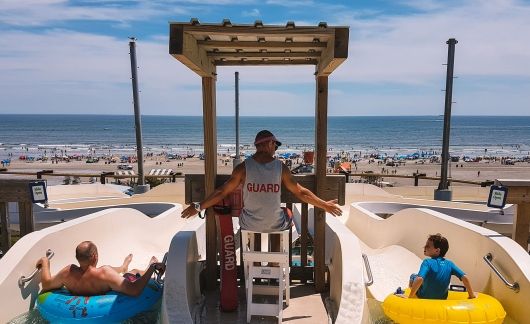Reaching Out to Your Students
Extend A Warm Welcome
You play a very important role in making your students’ stay in the United States pleasant, rewarding, and meaningful. As part of the CIEE Work & Travel USA program, you’re giving international students more than a job. You’re helping them discover American culture.
When it comes to forming a good working relationship and creating a positive atmosphere, how you interact with your students is essential. All it takes is a little attention and care on your part.
Before Your Students Arrive
CIEE Work & Travel USA students are embarking on an exciting adventure. This might be their first real job and first time away from home, so your initial contact is very important. Use the time between hiring and arrival to reach out to your students. Email is usually the best way to communicate.
This is your introduction and an opportunity to set the stage for the season. It’s a good idea to send it promptly, ideally within one week of hiring the student.
Some employers prefer a brief note with essential information, while others like to be comprehensive. Here are some of the things you might want to put in your initial email:
- A friendly introduction to you and your business
- An invitation for students to share their special interests and what they might want to see and do in the United States
- Photos of where they will be working
- A short description of your community and activities available outside of work
- Your standards and expectations, including uniform and grooming
- What additional communication is expected before arrival
- What to expect in the first few days after arrival
- A list of items to bring, such as clothing, linens, etc.
- Basic directions to your location
- When to expect the first paycheck
- When they can expect to hear from you again
- How they can reach you with questions
Need help getting started? Download the sample email.
Whether you’re housing your students or not, they will want to know about where they will be living. Send a separate email or include information about housing in your welcome email. Time this message to line up with any actions students need to take to secure a place to stay.
Read more about what your housing email might include
IF YOU’RE PROVIDING HOUSING, INCLUDE THE FOLLOWING:
- A description of housing options
- Photos of where they will be living
- How and when to sign up
- How roommate requests are handled
- Information about safe transportation between housing and work
IF YOU'RE NOT PROVIDING HOUSING, INCLUDE:
- Resources, contacts, tips for finding housing
- Information about safe transportation between housing and work
Learn more about student housing and transportation.
Keep the Communication Flowing
Staying in touch builds excitement and anticipation! Send updates on new workplace developments and news about the community. You might share photos of your business, details about your opening weekend, or let them know housing is ready. Let them know that you’re looking forward to their arrival.
Send Details & Final Reminders
A few weeks before arrival, send one last email to help guide your students once they land in the United States. Give some thought to what they need to know – it pays to not leave anything to chance.
What your final reminder email should cover:
A good final email will help to ensure your student arrives safely and on time. Include:
- Required days/times to arrive, and what to do if this is not possible
- How and when to notify you of travel plans
- How to get from the airport to your location (include your full address, phone number, contact email and if appropriate, a map)
- Where to go and what to do upon arrival
Helping Your Students Fit In
Cultural adjustment takes time. You play an important role in making the adjustment easier, both for your visiting students and your existing staff. You’ll be helping to create a great experience for everyone!
Have an Action Plan
COMMUNICATE
Check in and ask how things are going. Some students will speak their mind, while others might remain silent. You can prevent most misunderstandings by communicating often and clearly. If you need advice on how to encourage communication with your student, contact CIEE. This is not unusual and we’re happy to help.
SET YOUR NEW EMPLOYEES UP FOR SUCCESS
CIEE Work & Travel USA students will perform well, but may need extra help getting started.
Be patient – Your students are in a totally new environment, and might need a little more time and instruction before mastering tasks.
Be clear – Remember that English is not their native language. Speak slowly and directly, maintaining eye contact and being careful with your body language and tone.
Ask to hear your instructions back – Students may pretend to understand you to avoid embarrassment. Asking them to repeat instructions back to you is a good way to be sure they understand you.
Don’t take things for granted – Be specific about arriving on time, hygiene, smoking, and meal breaks. For example, be clear on why it’s important for them to be punctual, the impact on customers and other employees. When someone understands the “why” behind the rules, it’s easier to follow them.
UNDERSTAND CULTURE SHOCK
Knowing what to expect can help you be supportive of your students as they adjust to their new surroundings. Everyone handles new situations differently, but adjustment usually happens in these clear stages:
Excitement – Your students are eager to experience new and wonderful things.
Frustration – The excitement wears off. Life may become boring, strange, or frustrating. Your students may feel anxious or withdraw. Kindness and compassion from co-workers and supervisors can make a huge difference at this stage.
Adjustment – Students become more comfortable in their daily “American life” and are happier.
Feeling at home – Your visitors truly embrace the new culture and may even adopt some of its aspects.
More about how you can ease culture shock
- Learn about your students’ culture, and share what you learn with your staff members. Talk about cultural adjustment issues with them. Explain that your visitors may have cultural differences to consider, and that expressions – gestures, tone, and demeanor – mean different things in different parts of the world.
- Organize activities such as cookouts or outings to build team spirit and help people get to know one another outside of work. These things can also boost your reputation as a great employer.
- Consider a “buddy system” that pairs local employees with students for support and guidance.
- Share helpful advice with your students, such as, "Stay positive and give yourself a chance!".
- Put yourself in their shoes-what would you need if you traveled far from home to live, work and play in a new culture?
- Be open and friendly, and people will respond in kind.
- Keep an open mind and a sense of humor.
- Contact CIEE if you need assistance on how to support your students


